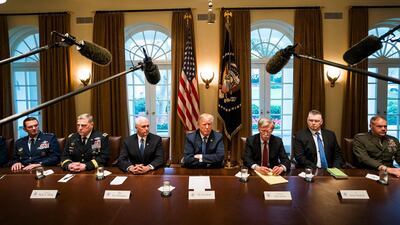Almost exactly a year ago, in the early hours of the morning, Syrian fighter jets dropped bombs on the rebel-held town of Khan Sheikhoun, outside the city of Idlib. Within minutes, a nerve gas began to envelop residents, convulsing their bodies and choking them to death. More than 80 men, women and children died.
Once again, as had happened before when the Assad regime used chemical weapons, there was an international outcry and a clamour for action. Something must be done, the analysts bayed, to enforce a global prohibition on the use of chemical weapons in war.
The response, when it came, was celebrated, as US President Donald Trump ordered a missile strike on the Syrian airbase from which the chemical weapons strike was apparently launched, the first time the US military had conducted such an attack during the Syrian civil war.
But although Mr Trump's military response exacted a price from the regime and was praised for it, as a way to enforce the global prohibition on such weapons it failed.
Far from enforcing a deterrent, the response actually undermined the whole principle of deterrence. Because the point of the response was not to merely “punish” the regime for its use of chemical weapons but to ensure that the regime never thought of using such weapons again. And as the attack last week in Eastern Ghouta showed, that clearly did not happen.
The use of chemical weapons has served a valuable purpose for the Assad regime. So far, after relentless shelling of the besieged enclave, thousands have left or been evacuated from Eastern Ghouta. The use of chemical weapons is a powerful psychological tool to flush out the rest, as well as sending a warning to other areas still under rebel control, such as Idlib, of what might – indeed, almost certainly will – happen.
Certainly, their use comes at a political cost but, as has been demonstrated so far, it is a cost that the regime is willing to pay.
The point of a deterrent is not that there is merely a price to be paid for the use of chemical weapons in war but that the price is so overwhelming that it makes them impossible to use. It is the overwhelming response that establishes and maintains the deterrent.
By contrast, if the price is, to continue the analogy of cost, merely expensive but manageable – as it has been so far for the Assad regime – then use of chemical weapons falls into the same category as any other military weapon, something that comes with costs and opportunities. Far from being a weapon of last resort, it instead becomes merely one more in the armoury.
That is precisely what happened last year with Khan Sheikhoun. The cost to the United States of a response was staggering. It spent an estimated $100 million for 50 Tomahawk missiles to explode in a broadly empty Syrian airbase – but the cost to the regime was manageable with the loss limited to perhaps two dozen fighter jets.
Remember that it has been five years – half a decade – since Bashar Al Assad first used chemical weapons against civilians and in that time, nothing approaching anything that could be described as overwhelming force has been used to exact a price.
Last September, the United Nations issued a report that claimed the regime had used chemical weapons on 20 separate occasions and perhaps as many as 25.
It seems clear that, for all the platitudes of the international community, when it comes to actually enforcing the red lines on chemical weapons, mere words are enough. Far from prohibiting the use of chemical weapons, the timid response has in fact normalised them.
How different from another chemical attack just a month ago. When a Russian-made military grade nerve agent was used against a former Russian spy and his daughter in a town in England, the response was coordinated and politically costly. More than 100 Russian diplomats were expelled from countries across Europe and the western world. The response sent a very clear and unambiguous message to Russia – that even such a small-scale attack like the one in Salisbury would not be tolerated and would carry significant costs.
Given that background and given how hard the UK has been pushing for a response to the Ghouta attack, it is possible that the US will act militarily.
But what it can do today to enforce genuine deterrence, rather than merely punish the regime, is very limited. What is needed now is an overwhelming response but the wider political situation, with Russia and Iran so deeply embedded and the US administration deeply hostile to foreign entanglements, mitigates against it.
The prohibition on the use of chemical weapons has stood for decades. It formed part of the framework of the international order, the idea that even war could be subject to rules, norms and laws and that some weapons were simply too deadly to be used. Today, that prohibition has been effectively overturned. In the long term, that might be one of the worst legacies of the Syrian war.
After the attack in Ghouta, a photograph of a Syrian doctor in a hospital in the city was widely shared on social media. He was holding up a sign that said: “Assad sees no red lines, only green lights”. The light may have changed briefly to amber but the message is the same: proceed, but with caution.


